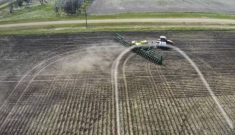Guideposts
The prevailing wisdom seems to be that this operation will be like so many others, a brief flash in the pan followed by a quick collapse, and then maybe a chance to pick up a tractor or combine on the cheap at the auction sale.
At coffee shops, elevators and kitchen tables, and on Internet message boards, the reaction to the announcement was near-unanimous in farm country.
That announcement said a million-acre farm is coming to the Prairies which will see the Bay Street hedge fund operator Eric Sprott rent land that First Nations bands had purchased as part of their treaty land entitlement settlements.
Read Also

How scientists are using DNA and climate data to breed crops of the future
A method for forecasting how crops will perform in different environments so that plant breeders can quickly select the best parents for new, climate-resilient varieties.
All hat, no cattle was the farm reaction. Someone with little or no knowledge of agriculture saw high grain prices last year, and unwisely thought they could cash in.
The new entity is One Earth Farms, and one thing that everyone agrees on is that if it succeeds, it will set new rules for the farming game on the Prairies, across the country and probably the continent.
It’s not like Canada’s farmers haven’t seen this all before. Every so often, someone gets the idea that they’re going to make their fortune in farming and they come along determined to make a big splash.
More often, they make a splat.
Maybe this time, though, the conventional wisdom is wrong. Maybe agriculture’s paradigm really has changed.
The manager
Larry Ruud is the brain who’s running the operation. He’s the CEO of One Earth Farms, and he’s no stranger to agriculture. Nor is he unaware of the skepticism that surrounds the project.
Ruud farms in the Vegreville area, about an hour east of Edmonton. He worked for years as a farm management consultant with the consulting and accounting firm Meyers Norris Penny, and — oh yes — he sits on the board of directors of grain giant Viterra.
Ruud tells me he’s more than familiar with the tragi-comic storyline that farmers in the region believe he’s walking into — but he hastens to add that he doesn’t fit this mould.
“I’ve shared the podium with people like that for the past 20 years,” Ruud says with a chuckle, alluding to speaking engagements during the annual winter farm meeting season. “We’re not basing our business plan on last year, and frankly we’d be fools if we were.”
Speaking with Ruud, it quickly becomes apparent that he’s putting all his smarts into coming at this project from a clear-eyed business perspective, with no dreams of pie-in-the-sky wealth. Where you might expect to hear wildly inflated growth projections, instead you hear a note of caution.
“It’s possible to be optimistic about the agriculture sector generally, while still being cautious about the business you’re operating,” explains Ruud.
Nothing he says during our entire interview so epitomizes the man and his project.
One way that Ruud is converting that caution into business strategy is the scope of what he’s taking on in the first year. Following the media conference in Saskatoon, the figure that stuck in everyone’s mind was a million acres, because that’s the total acreage that One Earth Farms has an agreement in principle to rent.
But the fine print of the contract also notes that they’ve got some time to exercise that option, and Ruud says the reality on the ground will be a lot more modest initially.
“We’ll be in the 15,000-to 20,000-acre range this year,” Ruud says, making no apology to anyone.
“Our goal this year is to get started in both the grain and cattle business.”
Suddenly the project is cut down to the size of some of the largest existing operations in the region, and perhaps to a manageable size for a start-up operation. Furthermore, most of the work will be done by custom operators, with local farm managers making the agronomic calls on the operations in the fields.
Ruud says he’s not surprised to hear a lot of skepticism about the project, but says he’s not paying much attention to it. Instead he’s focused on the future, and on making history with the first large-scale corporate farm in the region.
“There are no models out there to do this,” Ruud explains. “There are models for places like Brazil, but not Western Canada.”
Greg Porozni also farms in the Vegreville area and he’s been involved in a number of farm groups over the years, most recently as the newly-appointed chair of the Alberta Grain Commission. He’s known Ruud for years, and has great respect for his work and abilities.















